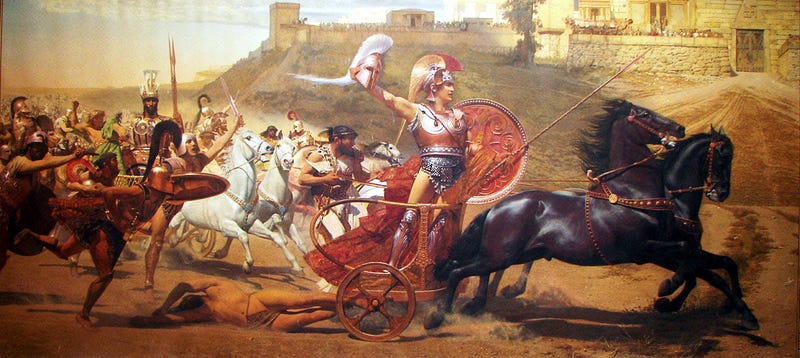
The virtues of a new creative era
We hear a lot about passion these days. Everyone is passionate about this, or has a passion for that. Life coaches and personal development authors push people to find their passion. But I’ve always suspected that passion is not what gets us to do our best work — our boldest stuff. Passion, after all, isn’t really a virtue. It’s a vice — and a pretty bad one. Crimes of passion — not considered a good thing.
What everyone is after, then, is that creative virtue that makes you do those bold and creative things that move the needle.If there are such things as creative virtues, certainly chief among them is courage. But what exactly is courage, and how do we as creatives practice it?
Aristotle thought a lot about courage — about the virtues as a whole, actually. His big idea on the subject is that every virtue is really just a middle ground between two extreme traits. Courage then, is the middle-ground between being cowardly and being rash or foolhardy. When you shy away from every challenge, every peril, you are cowardly. When you throw yourself at everything with abandon, you’re rash — acting stupidly.
Courage is Not Passion
Most people mistakenly think that rashness — the willingness to jump headlong into anything — is courage, and that may be why there’s so much ink spilled these days telling us that that failure is a good thing. People have been misidentifying courage for centuries, and they’re just now finding out what it really means.
When you act courageously, you act with a tempered zeal that makes failures merely another obstacle along the path. Courage means throwing it all in the ring when you truly believe that you’re doing the best you can. In that sense, you never really fail, you just don’t get where you set out go. But you either collect yourself, get back up, and keep going, or you die.
In either case, the failure won’t bother you.
But courage requires a little wisdom, lest we act merely out of unchecked passion. That is more reflex than action — hardly laudable and not at all brave. Here’s Aristotle:
Thus they are not brave because, driven by pain and passion, they rush on danger without foreseeing any of the perils, since at that rate even asses would be brave when they are hungry. (Nicomachean Ethics, Book III; Sec. 8)
So real courage requires both knowledge — of what the risks are and what the rewards can be — and passion — for the path you’ve chosen to pursue. There is no courage in choosing not to think deeply about what you’re trying to do — in just making something hastily and tossing it out to the world. Likewise, there is no courage in the tedious and endless work of “perfecting” something, always fearful of letting it go, because it may not be an overnight success.
Courage lies somewhere between those two.
Courage Means Pursuing Hard Truths
When a creator invests herself in her art — in creating something — then how the creation is received should matter very little. That willingness to create with disregard to who will care and how much, is true courage. Prince had it. David Bowie had it. Basquiat had it. Unfortunately, we no longer have them. But we have their legacies — lives of courage as creators.
Again, this does not mean being insensitive to matters of taste and to the wider philosophical discussions taking place in the world. Quite the contrary. Great artists are well aware of the deep conversations of their audience — they’re knee-deep in exploring those things in their work. But they don’t incessantly intrude into those conversations, and especially not as a way of checking their work to see how much people will like it.
Another thing we see in Aristotle regarding courage is that courage is related to knowledge. It’s as if when one is more connected to the truth, courage should come more readily. I don’t say easily because I don’t think courage is ever easy — that would probably be contradictory.
I’ve said before on numerous occasions that the artist’s work is work toward realizing, revealing, and expressing truths. It would make sense, then, that the more you as a creator are creating work that reveals a truth, the more courageous you need to be. Not everyone is prepared for the the truth. The truth is often uncomfortable. The truth is often downright painful. But the truth — as an artist — is your mission. Because of that, your mission will not be easy — and you have to be courageous.
Courage Does NOT Mean not Compromising
I think it’s naive to believe that artists shouldn’t compromise. It’s short-sighted. Compromise is an essential part of human growth. If you want to grow as a human, you must compromise. If you want to grow as a creator, you must compromise. The difference between sell-outs and geniuses is not whether they compromise (they both do), it’s what they compromise, and why.
Creators are taking part in an ongoing conversation, and a conversation is only a good one if the participants allow their minds to be changed by the conversation. So, if you’re really taking part in the conversation as a creator, you’d better stay open to compromising. That doesn’t mean compromising something you really believe in to sell more work.
What it does mean is being willing to listen to feedback that may initially clash with your vision and viewpoints. Because guess what: your vision can and should change over time. You can and should evolve over time. Doing so requires careful thought, introspection, and continued work.
So get to it.